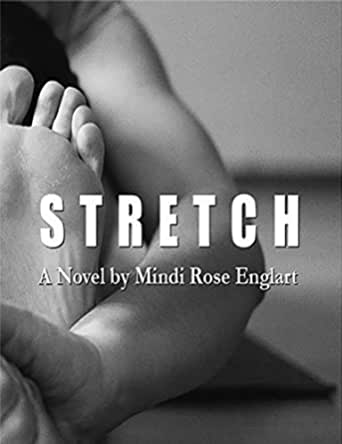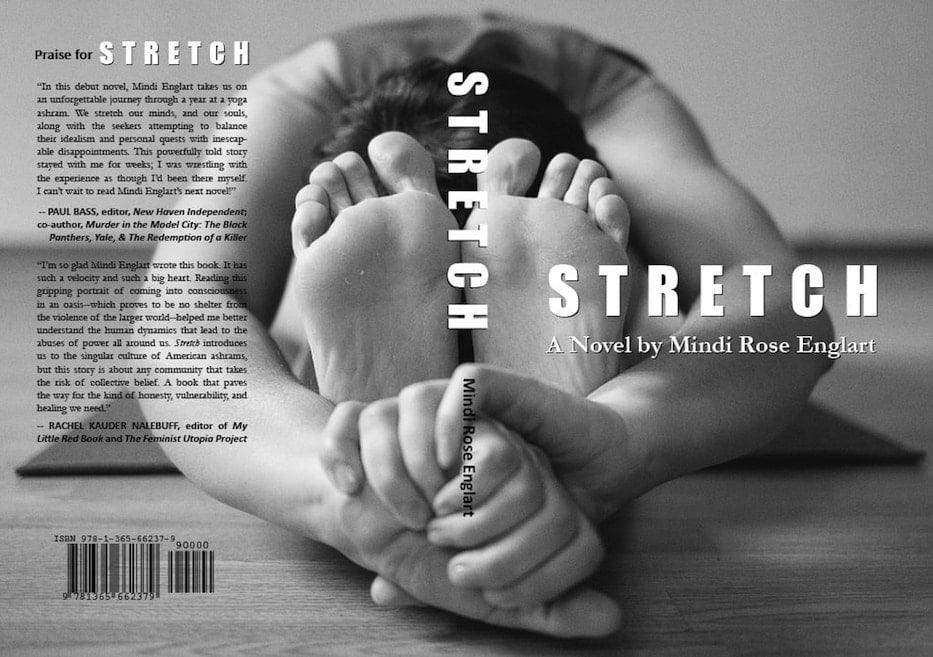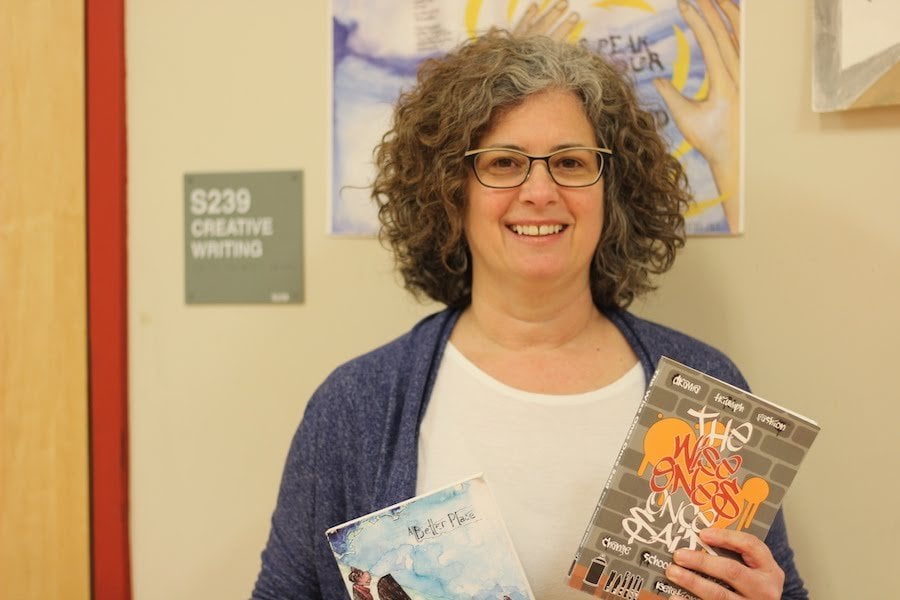
Books | Education & Youth | Local reads | Arts & Culture | COVID-19

It took Mindi Rose Englart 25 years to tell the story of her time in a Massachusetts ashram. Now that it’s out in the world, she’s starting to find a sense of closure.
Englart, who teaches creative writing at Cooperative Arts & Humanities High School, is the author of Stretch, which she released through Amazon last year. The novel is based on her four years at the Kripalu Center for Yoga & Health, then a guru-centered ashram in Stockbridge, Mass. The title carries multiple meanings: it is a literal reference to yoga, but also very much a coming-of-age story in which Englart stretches herself as a storyteller and a witness.
“The story needed to be told,” she said in a recent interview over Zoom. “There was no period on that experience. I had to do it. It would not go away. I thought about it all the time. It was so confusing, and I made it into something concrete.”
Englart began her time at Kripalu in the early 1990s, just years before the center was rocked by revelations of sexual impropriety among its ostensibly celibate leadership. At the time, she was 25 years old and “very, very idealistic,” she said. In the novel, there’s something of her younger self in narrator Miriam Ruth (Mary) Weisman, a young artist who has come to shed the hierarchical trappings of capitalism for a lifestyle of moderation and self-improvement.
In a Kripalu-esque site called "The Center," Mary—or as she’s recognized for much of the book, Kalika—sees a sanctuary that prioritizes spiritual and bodily health, daily mindfulness practice, and collective work. In particular, she’s delighted by her seva, a daily service practice that places all residents on the same occupational plane. Lawyers scrub toilets beside artists who make a fraction of their salary in the real world. Venture capitalists and punk rock musicians might both get assigned to kitchen duty.
She’s also drawn to a promise of celibacy: sex is off the table because it distracts from a spiritual practice. There’s a doe-eyed idealism there: West versus East, hierarchical versus horizontal, consumer versus creator, a life of discipline versus one of hedonism. And so too, maybe, a false binary—the belief that one must fully embrace or denounce something, instead of living in the in-between.
“It was a radical place because sex is embedded in society,” Englart said. “I thought, I can really relax and create intimacy in a different way.”
The longer Mary stays—and the more dedicated to her practice she becomes—the more she realizes that no refuge is immune to the power grabs that exist outside of its walls. In particular, her path to study beside a renunciate—someone who has given up earthly needs, including sex—becomes a surprising and vulnerable exploration of naivety, boundary-setting, violated trust, and gaslighting.
Her experience remains richly textured: readers smell thick, fragrant incense, contort themselves into long yoga poses and panic-inducing sweats, rent cars from a communal fleet, and taste the gomasio and raw beets in which Mary delights. They feel her anxiety rise, warm and prickly to the touch, and see it vanish as she meditates it away. As her world unspools slowly, Mary’s story becomes a cautionary tale that feels timely decades after it took place.

Englart in April 2019, outside her classroom at Co-Op. Lucy Gellman File Photo.
From the outset, Englart’s strength lies in bringing the reader all the way into the ashram’s world. She writes vividly and with all five senses, which results in a work that is as immersive as it is dynamic. It’s hard not to become invested in Mary’s story because there’s a sense of having met her: she’s the friendly but quiet girl down the block, the artist who drew in the back of that college seminar you don’t remember the name of, the young woman downtown who has been told to smile more too many times this week.
As Mary becomes invested in herself, her spiritual training, and her friendships, Englart probes the seesaw of corruption and community that can live in a single place, forever trying to balance each other out. In the novel, the narrator's trust leaves her exploited, victim-blamed and dismissed. Englart’s eye for detail is enough to make a reader heartsick. In real life, the author left in a mass exodus around the time that Kripalu’s guru admitted to having sex with three of his students. She was among hundreds who left.
“That’s when I began to understand the words cognitive dissonance,” she said. “People just went wherever they went. People left quickly. I did. We didn’t have jobs. We didn’t have money. We were insular. We all had to start from scratch. I had nothing. We all lived this very monastic life.”
When Englart left Kripalu, she was 29 and emotionally reeling. She headed for New Haven, where she stayed with her aunt Judith Katz, who is now the chair of creative writing at Co-Op. She got a boyfriend. She started working for the New Haven Register. She kept making visual art, as she had every day at the ashram. Even as “I just did the things that people do that are normal,” she felt an open wound where Kripalu had been.
She knew there was a story there, but didn’t know how to tell it. In the 1990s, no one was using the term gaslighting. It would still be a decade until Tarana Burke launched the beginnings of the Me Too movement, and almost two until the movement became widely used and accepted in the mainstream media.
“It was very humiliating,” she said. “It was an ashram. And it was a community. But I think it also was a cult. I was disappointed in myself and disillusioned. At the same time, it never went away.”
Fragments of the story came out in spurts, including during her years as a Master of Arts in Liberal Studies (MALS) student at Wesleyan University. In New Haven, she joined a writing group where she’d pick the project up, then put it away for a while. When she was writing, “I wasn’t interested in putting people on blast,” she said. While Mary is her surrogate, the other characters are amalgams of people she met while there. She said she still stays in touch with a few friends, including one she met while cleaning toilets.
Englart also credited her students with helping her finish the story. In her classes at Co-Op, she urges high school writers to delve deep into their own personal experiences. When she told them about the project, she felt like a hypocrite. In recent years, she said one of them called her out on hypocrisy.
“When they read something or cover something, I tell them, ‘you don’t know what your ideas or your words will spur in someone else,’” she said. “Why would I hold back when I’m telling someone else to do that? My students, I tell them to do it, and I was being a hypocrite. And that was building in me. And once in a while, I would say something about it, and I had this fear or shame.”
She finished the book last April, less than a month after the first closures from Covid-19 rocked New Haven and moved her high school classes online. While she had initially hoped for a launch party in person, she has started to promote the book virtually and by word of mouth. She said she finally feels like there’s a period on a long, labyrinthine story that’s been swelling for a quarter of a century.
“It was therapeutic,’ she said. “It was synthesizing. It really isn’t about anybody else or for anybody else. To be honest, it just felt so great to have that behind me. It does create more space for me to have more future and less past.”
Stretch is available on Amazon. Find out more about Mindi Englart at her website.

